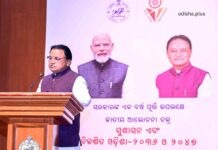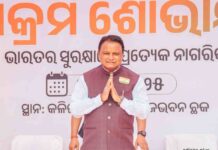with a nation like India, post the dastardly act of horrific and selective Hindu killings by militant Muslims, possibly in collusion with a sectarian rogue state like Pakistan, at the unsecured tourist spot of Pahalgam
Satya Narayan Misra

Jean Paul Sartre, the existentialist writer & philosopher of our times, had famously observed that: Man is condemned to be free. He was alluding to the fact that freedom also carries a heavy burden of responsibility, of having to make a choice. Similar is the case with a nation like India, post the dastardly act of horrific and selective Hindu killings by militant Muslims, possibly in collusion with a sectarian rogue state like Pakistan, at the unsecured tourist spot of Pahalgam. Should we bleed Pakistan with a thousand cuts, as Pakistan threatened India, by choking off the water in Indus, Jhelum & Chenab, and recover the POK area of 13297 sq km (4.5 million population) purloined by Pakistan in 1947.
Or should India’s focus be on ‘globalizing its fight against fight against terrorism without internationalizing the Kashmir issue,’ as Suhani Hyder has suggested. Should war mongering and the tirade of hatred against the Muslims in general go unabated, or should it be supplanted by peace initiatives and dialogues, and isolating the militants of any religious hue by beefing up our intelligence apparatus and propping up the security network?
In a thought-provoking and widely read book, “Idea of India” (1997) by Sunil Khilnani, he believed that ‘constitutional democracy and pluralism have prevented monolithic outcomes. It has also stalled zealots in their tracks and taken the wind out of populist sails.” Given the kind of polarization that bedevils India and is being fomented, he had the prescience to observe that ‘We need to think and act beyond aggressive essentials of a monochrome selfhood and save the idea of a plural idea from being usurped by state power and predilection for cultural uniformity’.
Apart from these endogenous factors, India is today pitted against exogenous factors like China openly aiding Pakistan with potent fighter aircraft, Turkey supplying lethal drones, Russia, strangely benign, unlike its full-throated friendship in 1971, and a mercurial Trump for whom trade matters more than the sovereignty of a nation. With the old institutional order of UNO, the Security Council created after the War II to foster global peace being largely defunct and the rise of unilateralism of bullies like Putin, Trump & and Jinping, being the order of the day, bilateralism and Free Trade Agreements between countries have become the odious order of the day.
It was John Foster Dulles, the hawkish US Secretary of State, who had famously said, “There are no permanent friends, no permanent enemies, only permanent interests”, suggesting that nations should prioritize their interests over long-term alliances or rivalries. India is on the cusp of this hard reality. The manifestly frosty and hostile relationship between Indira and Nixon has been supplanted by Modi Trump bear hug. Yunus, the Chief Advisor of Bangladesh, which owes its independence to Indira and India, is actively cavorting with India’s bête noire, China. Russia, which called the US bluff of frightening India through its Seventh fleet in the Indo-Pak war of 1971, does not show similar masculine friendship, possibly because India’s tilt towards the US in matters of major defense acquisition, where Russia earlier had a near monopoly. India’s de-hyphenation policy after 2014 seems to have landed India without the strategic support certainty that the Russians provided.
Lt Gen Hooda, who as Army Commander oversaw the surgical strike in 2016 against Pakistan, believes that the character of conflict has changed from a test of endurance, close quarters fight in high altitude terrain in Kargil, is now being fought from afar using drones, standalone precision weapons, and long-range missiles. The costly manned combat aircraft are being replaced with inexpensive expendable reconnaissance drones. In air defence, fixed hardware is being replaced by a layered network. Gen Hooda believes that since drones have become crucial to combat, there is a need for the right mix of manned and unmanned platforms. We also seem to have moved out of a reactive defense-oriented strategy to a proactive, defense-based doctrine.
In the four-day war, one of the biggest casualties was the fear of civilian life, including children, which was witnessed in the districts of Jammu and Kashmir, Pathankot in Punjab, and the districts of Rajasthan bordering Pakistan. And the swirling fear that shrouds the bordering areas, disruption of communication, and increasing hostility towards the Muslim community. Fortunately, the local Kashmiri Muslims stood rock solid with India, as they realized the advantage that flows out of tourism to the lives and livelihood of local Kashmiris. From 2.5 million tourists in 20020, it had zoomed to 20.6 million in 2023. Restoring peace and geopolitical stability must be given the highest priority.
As the diplomatic outreach visits to different countries start today, it would be worth the while to recall how Dr Manmohan Singh had sent multi-party delegations to different continents with dossiers on Pakistan’s links to the terror attacks. It’s a tribute to the robust democratic traditions that India has displayed through bipartisanship when faced with a grave national crisis.
As John Brittas, CPI (M), a trenchant critic of the Modi government, and part of the delegation, said, “We will be interacting with a cross-section of people, to highlight how the terror is being exported to India from Pakistan”. It would also be worth recalling how, in 1994, during the Nagaland conflict, the Naga Mothers Association formed a Peace Team as part of a campaign called ‘Shed No More Blood’ that actively arbitrated a truce between the Indian government and NSCN (IM).
In the changed post-WWII order, Russia seems to be more inclined towards China than India. The trend is towards greater bilateralism than multilateralism, which was the objective of the WTO. It would also be worth recalling how Jean Monnet, the French diplomat, sowed the seeds of economic cooperation between the bitterest rivals, France & Germany, by forming ECSC (European Coal & Steel Community) in 1951 to underscore the importance of practical economic cooperation between countries.
We must strengthen the values of democracy, pluralism, and open-mindedness that distinguish us from Pakistan. Hyper masculinity must give way to pacifism, people-to-people contact, engagement in sports, cultural, social, political, and economic cooperation between India & Pakistan, and a mutual resolve to marginalize extremist elements.
(The Author is an Economist & Strategic Analyst. Views expressed are personal.)
Read More: Some Reflections on India and the USA




























